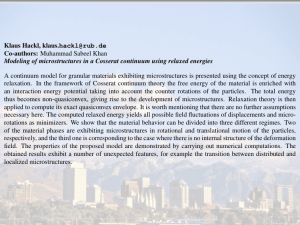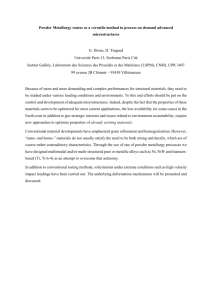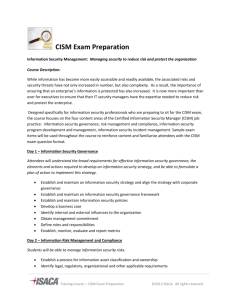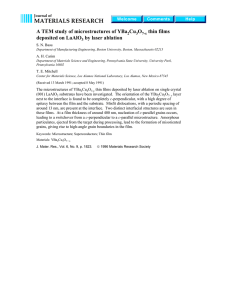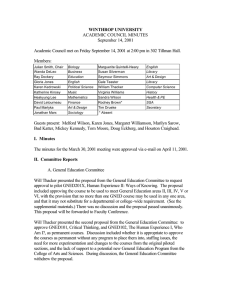ADMISSION AND ACCOMMODATION
advertisement
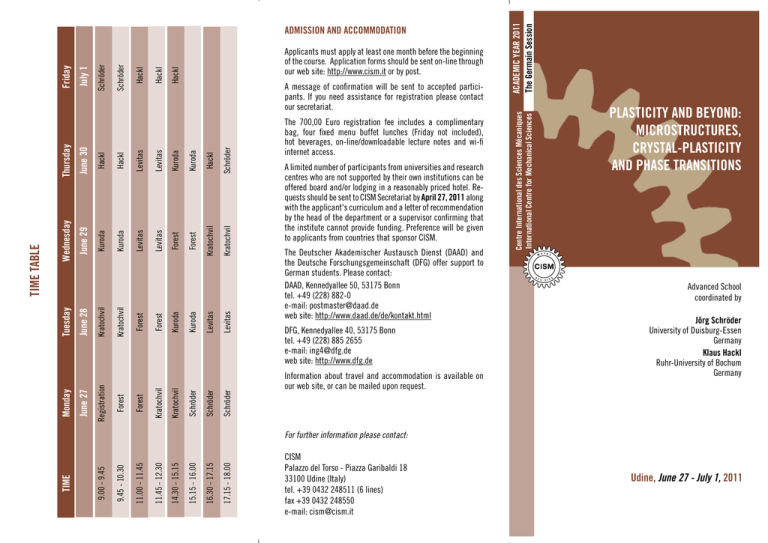
Schröder Kratochvil Schröder Levitas Hackl Kratochvil Schröder Levitas Kuroda Forest Kuroda Schröder The 700,00 Euro registration fee includes a complimentary bag, four fixed menu buffet lunches (Friday not included), hot beverages, on-line/downloadable lecture notes and wi-fi internet access. A limited number of participants from universities and research centres who are not supported by their own institutions can be offered board and/or lodging in a reasonably priced hotel. Requests should be sent to CISM Secretariat by April 27, 2011 along with the applicant's curriculum and a letter of recommendation by the head of the department or a supervisor confirming that the institute cannot provide funding. Preference will be given to applicants from countries that sponsor CISM. The Deutscher Akademischer Austausch Dienst (DAAD) and the Deutsche Forschungsgemeinschaft (DFG) offer support to German students. Please contact: DAAD, Kennedyallee 50, 53175 Bonn tel. +49 (228) 882-0 e-mail: postmaster@daad.de web site: http://www.daad.de/de/kontakt.html DFG, Kennedyallee 40, 53175 Bonn tel. +49 (228) 885 2655 e-mail: ing4@dfg.de web site: http://www.dfg.de Information about travel and accommodation is available on our web site, or can be mailed upon request. ACADEMIC YEAR 2011 The Germain Session Centre International des Sciences Mécaniques International Centre for Mechanical Sciences Hackl Kuroda Kratochvil Kuroda Forest Hackl Levitas Kratochvil Forest Levitas Hackl Levitas Forest Forest Levitas Schröder Hackl Forest Kratochvil Kuroda Schröder Hackl Kuroda Registration Kratochvil June 30 June 29 June 28 June 27 Monday Tuesday Thursday A message of confirmation will be sent to accepted participants. If you need assistance for registration please contact our secretariat. Wednesday July 1 Applicants must apply at least one month before the beginning of the course. Application forms should be sent on-line through our web site: http://www.cism.it or by post. PLASTICITY AND BEYOND: MICROSTRUCTURES, CRYSTAL-PLASTICITY AND PHASE TRANSITIONS Advanced School coordinated by Jörg Schröder University of Duisburg-Essen Germany Klaus Hackl Ruhr-University of Bochum Germany 9.00 - 9.45 9.45 - 10.30 11.00 - 11.45 11.45 - 12.30 14.30 - 15.15 15.15 - 16.00 16.30 - 17.15 17.15 - 18.00 TIME For further information please contact: TIME TABLE Friday ADMISSION AND ACCOMMODATION CISM Palazzo del Torso - Piazza Garibaldi 18 33100 Udine (Italy) tel. +39 0432 248511 (6 lines) fax +39 0432 248550 e-mail: cism@cism.it Udine, June 27 - July 1, 2011 PLASTICITY AND BEYOND: MICROSTRUCTURES, CRYSTAL-PLASTICITY AND PHASE TRANSITIONS Plasticity is a key phenomenon for a large class of materials with a variety of applications in science and technology. In the last few decades several phenomenological theories have been developed in order to describe the mechanics and thermodynamics of such processes on the macroscopic level. Nevertheless, these “classic” models have reached their limits in various respects. Extensions of these models should take into account the formation of microstructures and the microheterogeneity of the underlying multiphase materials. The macroscopic response functions are determined by appropriate averages of microscopically associated field quantities over evolving microstructures. The role of microstructures becomes more and more noticeable with a decreasing size of the material specimen considered. Scale-effects play a major role in modern micromechanical applications. Microstructure is indeed crucial, since plastic behavior typically is the result of the interaction of complex substructures on several length scales. The macroscopic behavior is then determined by appropriate averages over the (evolving) microstructure. What is needed are models which are more closely related to physics and material science and which are able to take into account the microstructural behavior of the material. These models rely strongly on variational formulations for which effective mathematical and numerical concepts have been developed only recently. Modern engineering applications require the reduction of structure weight while improving safety properties. Therefore, advanced high strength steels play an important role since they offer solutions to these demands. Due to their micro-heterogeneity high strength steels pose outstanding challenges with respect to material modeling. In order to capture the complex interplay between the individual constituents a multiscale modeling technique has to be applied. In a first approach an applicable numerical tool for the direct incorporation of these micromechanical information is the FE2-method (twoscale approach). A main problem of such direct homogenization methods applied to large random microstructures is the high computational cost with respect to both, the amount of memory and the computation time. Therefore, the construction of statistically similar representative volume elements (SSRVEs), which are characterized by much less complexity than usual random RVEs is applied to overcome this drawback. The aim of the course is to join world leading experts in the area of experimental plasticity, crystal plasticity, phase transitions, advanced mathematical modeling and multi-scale modeling. The course is organized so as to approach the above mentioned problems from different perspectives. Modeling techniques: They will cover concepts of classic and extended continuum thermodynamics, phasefield modeling, higher-order models like gradient plasticity or micropolar models at finite deformations. The associated algorithmic treatments are mainly based on finite element formulations for standard (local approach) as well as for non-standard (non-local approach) continua and for pure macroscopic as well as for directly coupled two-scale boundary value problems. Applications: The course will cover some of the most important appli- cation areas in material design/processing ranging from grain boundary effects in polycrystals and phase transitions to deep-drawing of multiphase steels by directly taking into account random microstructures. The course is addressed to Doctoral students, young researchers. A problem for young scientists trying to do high level research in this area is the number of topics one has to be familiar with: Experimental observations, continuum thermodynamics, crystal physics, dislocation theory, phase transition, generalized convexity analysis and formation of microstructures, phase-field-modeling, multi-scale modeling, and the algorithmic modeling of this highly nonlinear processes. For a significant progress, high quality research and innovative applications it is important to know the essentials in these fields and their respective interplay. Furthermore, there are neither adequate textbooks nor advanced courses at research/university level available. The aim of this CISM course is to fill this gap. PRELIMINARY SUGGESTED READINGS J. Besson, G. Cailletaud, J.L. Chaboche, S. Forest and M. Bletry, Non-linear mechanics of materials. Springer. 2009. S. Forest, The micromorphic approach for gradient elasticity, viscoplasticity and damage. ASCE Journal of Engineering Mechanics. 2009. 135. 117-131. V.I. Levitas, D.-W. Lee and D.L. Preston, Interface propagation and microstructure evolution in phase field models of stress-induced martensitic phase transformations International J. Plasticity, 2010, Vol. 26, No. 3, 395-422. J. Schröder, D. Balzani and D. Brands, Approximation of random microstructures by periodic statistically similar representative volume elements based on linealpath functions. Archive of Applied Mechanics, 2010, DOI: 10.1007/ s00419-010-0462-3. K. Hackl and D.M. Kochmann, Relaxed Potentials and Evolution Equations for Inelastic Microstructures. IUTAM Symposium on Theoretical, Computational and Modelling Aspects of Inelastic Media, Springer Netherlands, 2008, 27-39. S. Bartels, C. Carstensen, K. Hackl and U. Hoppe, Effective relaxation for microstructure simulations: algorithms and applications. Computer Methods in Applied Mechanics and Engineering, 2004, Vol. 193, No. 48-51, 5143-5175. INVITED LECTURERS Samuel Forest - Mines ParisTech, France 6 lectures on: Micromorphic crystal plasticity and microstructure evolution during phase transitions. Mechanics of generalized continua. Plastic microdeformation field within a continuum thermomechanical framework. Strong plastic strain gradients in polycrystalline aggregates. Klaus Hackl - Ruhr-University, Bochum, Germany 6 lectures on: Variational framework for inelastic materials. Minimization problems involving nonquasiconvex potentials. Initiation of material microstructures. Finite crystal plasticity. Relaxed energies and dissipation potentials. Evolution of microstructures. Jan Kratochvil - Czech Technical University, Prague, Czech Republic 6 lectures on: Formation of deformation substructures, types of observed dislocation structures in single crystals and polycrystals induced by tension, compression, cycling and severe plastic deformation. Theoretical models of substructure formation treated as an instability of deformation modes. Mitsutoshi Kuroda - Yamagata University, Japan 6 lectures on: Scale-dependent crystal plasticity: Foundation and experimental observations. Origins of the size effect. Work-conjugate and non-work-conjugate type of gradient-dependent crystal plasticity formulations. Numerical methods and examples. Valery Levitas - Iowa State University, Ames, Iowa, USA 6 lectures on: Mechanically induced phase transformations (PT) and chemical reactions. General thermodynamic and kinetic theory of PT in elastoplastic materials. Nano- and microscale phase field approach to martensitic PT, multivariant microstructure evolution. Jörg Schröder - University of Duisburg-Essen, Germany 6 lectures on: Direct micro-macro-transition procedure (FE2method). Consistent linearization and computation of overall moduli. Scalar-valued and higher-order statistical measures and design of suitable statistically similar representative volume elements. Applications. LECTURES All lectures will be given in English. Lecture notes can be downloaded from CISM web site, instructions will be sent to accepted participants. PLASTICITY AND BEYOND: MICROSTRUCTURES, CRYSTAL-PLASTICITY AND PHASE TRANSITIONS Udine, June 27 - July 1, 2011 Application Form (Please print or type) Surname _ ________________________________________ Name _ __________________________________________ Affiliation________________________________________ Address__________________________________________ _______________________________________________ E-mail__________________________________________ Phone___________________Fax______________________ Method of payment upon receipt of confirmation (Please check the box) The fee of Euro 700,00 includes IVA/VAT tax and excludes bank charges ❏I shall send a check of Euro _______________________________________ ❏ Payment will be made to CISM - Bank Account N° 094570210900, VENETO BANCA - Udine (CAB 12300 - ABI 05035 - SWIFT/BIC VEBHIT2M - IBAN CODE IT46 N 05035 12300 09457 0210900). Copy of the receipt should be sent to the secretariat ❏ I shall pay at the registration counter with check, cash or VISA Credit Card (Mastercard/Eurocard, Visa, CartaSì) IMPORTANT: CISM is obliged to present an invoice for the above sum. Please indicate to whom the invoice should be addressed. Name______________________________________________________________________________________________________ Address __________________________________________________________________________________________________ ________________________________________________________________________________________________________________ ________________________________________________________________________________________________________________ C.F.*________________________________________________________________________________________________________ VAT/IVA* No.______________________________________________________________________________________________ (*) Only for EU residents or foreigners with a permanent business activity in Italy. Only for Italian Public Companies ❏ I ask for IVA exemption (ex law n. 537/1993 - art. 14 comma 10). Privacy policy: I understand that data received via this form will be used only to provide information about CISM and its activities, within the limits set by the Italian legislative decree no. 196/2003 and subsequent amendments. Complete information on CISM’s privacy policy is available at www.cism.it. I have read the "Admission and Accommodation" terms and conditions and agree. Date _______________ Signature
